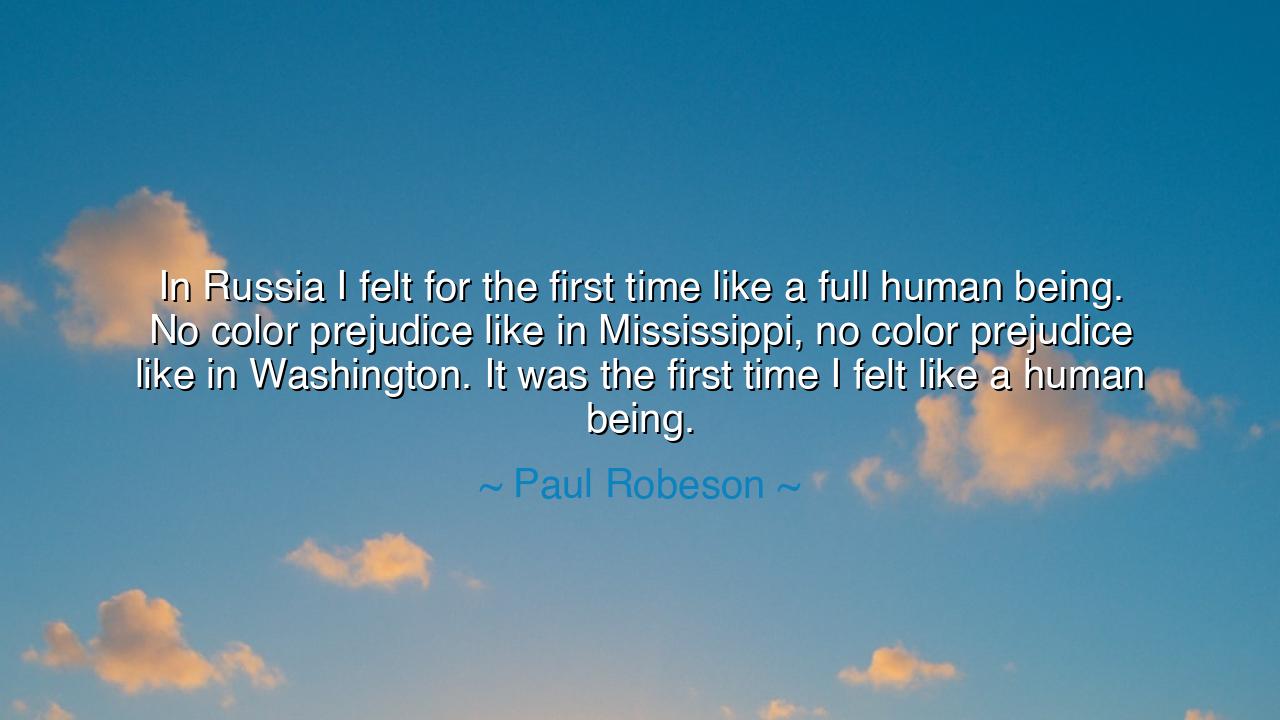
In Russia I felt for the first time like a full human being. No
In Russia I felt for the first time like a full human being. No color prejudice like in Mississippi, no color prejudice like in Washington. It was the first time I felt like a human being.






The words of Paul Robeson—“In Russia I felt for the first time like a full human being. No color prejudice like in Mississippi, no color prejudice like in Washington. It was the first time I felt like a human being.”—rise from the depths of pain and triumph. They are not the idle musings of a wanderer, but the cry of a man who bore upon his shoulders both the glory of his gifts and the chains of his people’s suffering. In his voice echoes the yearning of every soul denied dignity, and the astonishment of one who, having lived in the shadow of prejudice, suddenly steps into the sunlight of recognition.
To understand these words, one must remember that Robeson was not merely a singer, nor only an actor, but a colossus of spirit—an athlete, a scholar, and a champion of the oppressed. Yet in the land of his birth, the United States, his brilliance could not shield him from the lash of color prejudice. In Mississippi, the soil was heavy with the memory of chains; in Washington, the very capital of freedom, the dark hand of segregation still pushed his people aside. Thus, his greatness was often seen through the warped lens of race, as if his humanity were somehow conditional, as if his worth required the approval of others.
But when he journeyed to Russia, he encountered a world that startled his heart. There, in that distant land, men did not look upon him first as “Negro,” but as man. His skin was not a barrier but a vessel of his spirit, and he was welcomed not as a curiosity, nor as a lesser, but as a human being—whole, unbroken, complete. For the first time, the chains of invisibility fell away, and he stood revealed to himself as equal among equals. That moment was more than personal: it was the unveiling of a truth—that dignity is not granted by law nor withheld by custom, but is woven into the essence of every soul.
History offers us another mirror of this truth in the journey of Josephine Baker, who fled the narrow walls of America to find freedom in France. There, too, she was greeted not as an object of scorn but as an artist, as a woman, as a human being. The applause she received was not poisoned by prejudice but resounded with genuine recognition. Like Robeson, she discovered that sometimes it takes leaving one’s homeland to taste the sweetness of equality. The soil of one land may deny, while the soil of another restores. Such is the strange fate of those born in times of injustice: they must cross oceans to reclaim their own humanity.
Yet Robeson’s words, though born of his personal relief, carry a warning for us all. If one man must travel across the world to feel human, then the soil of his homeland is tainted. Prejudice, whether in Mississippi or in Washington, is not merely an insult to one man, but a wound in the body of the nation. For a society that denies the humanity of one group denies, in truth, its own humanity. To see the other as less is to diminish oneself.
Beloved listener, what then is the lesson for our time? It is this: never let the blindness of society dictate your worth. Like Robeson, know that your humanity is not contingent upon the acceptance of others. At the same time, let his journey call you to a higher duty—that you, in your own life, must create spaces where others feel fully human. Wherever you walk, let no prejudice, no narrowness, no blindness of custom strip another of dignity. Be the Russia to someone’s Mississippi; be the place where another soul feels seen.
Practical wisdom flows from this truth: listen deeply to those around you, honor their stories, and challenge the silent prejudices that dwell in speech, in law, in the structures of our world. Offer friendship not merely in word, but in presence; stand beside the marginalized; and most of all, see the human being first, before all labels, before all divisions. In doing so, you free not only them, but yourself, for dignity is not a gift one bestows, but a bond shared among equals.
So let Robeson’s cry echo across the generations: “The first time I felt like a human being.” May it never be said again in any land that men must leave their homes to find their humanity. Instead, let us be the builders of a world where every man, every woman, every child, in every place, may stand and say—not once, but always—I am a human being.






AAdministratorAdministrator
Welcome, honored guests. Please leave a comment, we will respond soon